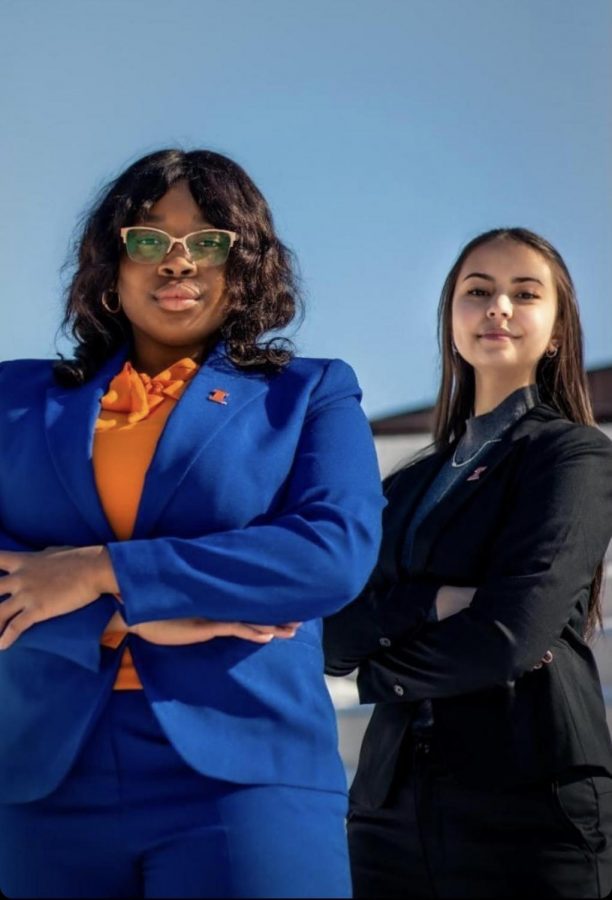ISG holds town hall on “hate speech,” free speech
Photo Courtesy of Logan Van Ness
Enoma Egiebor and Nicole Arnold are two ISG senators and chairpersons who organized the first town hall meeting regarding free speech versus hate speech.
March 1, 2021
The Illinois Student Government held the first town hall with University officials regarding hate speech versus free speech and discussed campus resources available for students and faculty who are subject to forms of hate speech on Feb. 23.
This town panel followed two lawsuits filed against the University. One of these lawsuits dealt with student allegations that the University unfairly restricts student speech whereas the other dealt with allegations that the University failed to address a hostile environment of anti-Semitism and anti-Zionism on campus.
Enoma Egiebor, sophomore in AHS and chair of Campus Affairs for ISG organized the event along with Nicole Arnold, sophomore in LAS and chair of Diversity and Inclusion. Egiebor noted the “controversy in the past in terms of what you can say, when and where” and said that Arnold and she hoped to clarify it for students with this town hall meeting.
“It’s in our rulebook essentially what we’re supposed to have a town hall that meets discussing the crossroads between hate speech and free speech, but it’s never been done so we decided to do it,” Egiebor said.
Panelists tried to distinguish hate speech and free speech and thoroughly discussed the resources available for students who were subject to any type of verbal discrimination or harassment.
Get The Daily Illini in your inbox!
Jason Mazzone, professor for Law, discussed how freedom of speech as guaranteed by the first amendment limits the government’s ability to regulate or restrict speech in any form that does not constitute a true threat, violence or incitement.
Since the University is public, it is a state actor that is restricted by the first amendment in ways private entities are not. For example, the University can require students to listen without disrupting in a classroom setting, but the University generally cannot restrict a students’ speech because of the content.
In regards to the recent controversy regarding University response to Palestinian activists on campus, Mazzone explained how the University administration’s role is not to provide any expertise about the topic, but rather to facilitate conversations with debate and dialogue.
“I think there’s very little value in trying to enlist the government in the form of a University administrator to end the conversation by taking your side,” Mazzone said.
Mazzone also talked about how there is no specific category of speech called “hate speech” that wouldn’t also be protected speech under the First Amendment, but “the fact that you have a right to do something or say something doesn’t necessarily make it wise to say.”
“Free speech isn’t free as there is always a cost,” said Dr. Shawna Patterson-Stephens, associate vice chancellor for Student Affairs and director of the Office of Inclusion and Intercultural Relations.
This cost may be psychological or emotional effects on the person listening, according to Stephens. She also stressed the importance of not “fighting fire with fire” and instead focusing on finding “spaces of affirmation” across campus that allow students to engage in constructive dialogue with each other.
If students are faced with any form of verbal harassment, they have options as to how they choose to respond. Sarah Colome, director of the Women’s Resource Center on campus, discussed how the center can assist students in responding to harassment by either taking action, creating a safety plan or providing other resources based on the students’ needs.
Justin Brown, director of the Office for Student Conflict Resolution, said how students can report instances of biased or hate-motivated behavior to either the Office for Student Conflict Resolution or the Bias Assessment and Response Team for action or resources.
OSCAR deals with instances of biased or hate-motivated behavior that wouldn’t be protected under the First Amendment either because it takes the form of vandalism, physical assault or creates a hostile environment.
Behavior that creates a hostile environment is “behavior that is so severe or pervasive and objectively offensive that unreasonably interferes with a student’s ability to fully participate in the university community,” according to Brown.
Brown said BART deals with informal responses to speech that are protected under the first amendment by providing support to those who need it and encouraging voluntary dialogue in the campus community following a BART report.
“Bias teams (including BART) really emerged from the fact that so many of the problematic behaviors that target marginalized and underrepresented students within university committee are often protected,” Brown said.
Egiebor said that as a student activist, the organization of this meeting was important to her. She is glad the town hall meeting went well and is excited to see what conversations ISG can assist in facilitating in the future.







